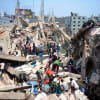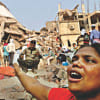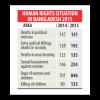Trial of two cases yet to start
The trial for the killing of more than a thousand people in Rana Plaza collapse three years ago is yet to begin.
The case filed for the violation of building codes in the construction of the nine-storey Plaza has been facing a similar fate.
However, charges were pressed in June last year against the accused in both the cases upon completion of the investigations.
The hearing on the charge framing is scheduled for April 28. The accused are expected to be produced on the day before the trial court where the cases were transferred in March last year, said a court source.
The delay in holding the trial was mainly caused by the labor ministry's refusal to give permission for accusing in the charge sheet three of its officials -- Deputy Chief Inspector (mills and factories) Jamsedur Rahman and inspectors (engineering) Yusuf Ali and Shahidul Islam, said a source in the Session Judge's Court in Dhaka.
The court finally used its inherent jurisdiction to take into cognisance the charges against the three and other accused on December 21 last year.
According to law, an approval from the government is required to name a government official in a charge sheet.
Meanwhile, the fear for not getting justice has become stronger with the trial procedure delayed, said Noor Khan, acting executive director of rights body Ain o Salish Kendra.
“While this delay reflects the prevailing culture of impunity, it also shows how difficult it is to bring wealthy and politically influential people to justice.”
People are eagerly waiting to see justice done for the victims of Rana Plaza, and the state should not let them down, Noor added.
Rehana Akhter, a Rana Plaza survivor who lost both her legs in the disaster, said she lost hopes of ever seeing justice for the loss inflicted upon her.
“I wish those responsible for my misfortune were punished. It would have set an example for other factory owners.”
The Criminal Investigation Department accused 42 individuals, including the building owner, Sohel Rana, in the charge sheets submitted to the court.
Forty-one were accused in the murder case, 17 of whom plus one were named in the charge sheet of the other case. One of the accused, Belayet Hossain, the then deputy chief inspector of the labour ministry, retired after the tragic incident.
Of the ministry officials, Shahidul and Yusuf were granted bail on February 10 after they surrendered before the court.
Rana's parents Abdul Khaleq and Morzina Begum and the then mayor of Savar municipality Refat Ullah are among the 23 who are on bail while the prime accused Rana, Jamsedur Rahman and four others are in jail and 13 are absconding.
At least 1,136 people, mostly garment workers, were killed and more than 2,500 injured in the building collapse on April 24, 2013, which sparked worldwide criticism of the standards of labour and human rights in Bangladesh.

 For all latest news, follow The Daily Star's Google News channel.
For all latest news, follow The Daily Star's Google News channel. 







Comments